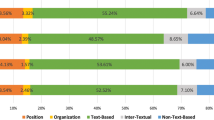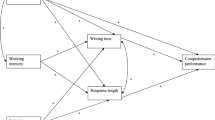Abstract
Prior work has examined the role of interest in students’ single text processing and comprehension, but interest has been under-examined within the context of multiple text use. This study examines two forms of interest, individual interest and situational interest, in the context of students’ completion of a multiple text task. Time on texts and the number of texts students accessed were examined in association with both forms of interest and as mediators of the relation between situational interest and task performance. Situational interest, but not individual interest, was found to be associated with time devoted to text use, a measure of persistence or engagement during task completion. Prior knowledge, situational interest, number of texts used, and time on texts were found to predict performance on a multiple text task. Additionally, qualitative data determined how students explained interest as arising during multiple text task completion. Directions for future research and implications for instruction are introduced.


Similar content being viewed by others
References
Ainley, M., Hidi, S., & Berndorff, D. (1999). Situational and individual interest in cognitive and affective aspects of learning. Paper presented at the American educational research association meetings, Montreal, Quebec, Canada.
Ainley, M., Hidi, S., & Berndorff, D. (2002a). Interest, learning, and the psychological processes that mediate their relationship. Journal of Educational Psychology, 94(3), 545–561.
Ainley, M., Hillman, K., & Hidi, S. (2002b). Gender and interest processes in response to literary texts: Situational and individual interest. Learning and Instruction, 12(4), 411–428.
Alexander, P. A., & Jetton, T. L. (1996). The role of importance and interest in the processing of text. Educational Psychology Review, 8(1), 89–121.
Anderson, R. C. (1982). Allocation of attention during reading. Advances in Psychology, 8, 292–305.
Braasch, J. L., McCabe, R. M., & Daniel, F. (2016). Content integration across multiple documents reduces memory for sources. Reading and Writing, 29(8), 1571–1598.
Bråten, I., Anmarkrud, Ø., Brandmo, C., & Strømsø, H. I. (2014). Developing and testing a model of direct and indirect relationships between individual differences, processing, and multiple-text comprehension. Learning and Instruction, 30, 9–24.
Bråten, I., & Strømsø, H. I. (2006). Epistemological beliefs, interest, and gender as predictors of Internet-based learning activities. Computers in Human Behavior, 22(6), 1027–1042.
Britt, M. A., & Aglinskas, C. (2002). Improving students’ ability to identify and use source information. Cognition and Instruction, 20(4), 485–522.
Britt, M. A., Rouet, J. F., & Braasch, J. L. G. (2013a). Documents as entities: Extending the situation model theory of comprehension. In M. A. Britt, S. R. Goldman, & J. F. Rouet (Eds.), Reading from words to multiple texts (pp. 160–179). New York: Routledge.
Britt, M. A., Rouet, J.-F., & Braasch, J. L. G. (2013b). Documents as entities. In M. A. Britt, S. R. Goldman, & J.-F. Rouet (Eds.), Reading-from words to multiple texts (pp. 160–179). New York, NY: Routledge/Taylor & Francis Group.
Chen, A., & Darst, P. W. (2002). Individual and situational interest: the role of gender and skill. Contemporary Educational Psychology, 27(2), 250–269.
Dias, P., Gomes, M. J., & Correia, A. P. (1999). Disorientation in hypermedia environments: Mechanisms to support navigation. Journal of Educational Computing Research, 20(2), 93–117.
Durik, A. M., & Matarazzo, K. L. (2009). Revved up or turned off? How domain knowledge changes the relationship between perceived task complexity and task interest. Learning and Individual Differences, 19(1), 155–159.
Fulmer, S. M., & Frijters, J. C. (2011). Motivation during an excessively challenging reading task: The buffering role of relative topic interest. The Journal of Experimental Education, 79(2), 185–208.
Garner, R., & Gillingham, M. G. (1991). Topic knowledge, cognitive interest, and text recall: A microanalysis. The Journal of Experimental Education, 59(4), 310–319.
Gil, L., Bråten, I., Vidal-Abarca, E., & Strømsø, H. I. (2010). Summary versus argument tasks when working with multiple documents: Which is better for whom? Contemporary Educational Psychology, 35(3), 157–173.
Goldman, S. R., Braasch, J. L. G., Wiley, J., Graesser, A. C., & Brodowinska, K. (2012). Comprehending and learning from Internet sources: Processing patterns of better and poorer learners. Reading Research Quarterly, 47(4), 356–381.
Guthrie, J. T., Hoa, L. W., Wigfield, A., Tonks, S. M., & Perencevich, K. C. (2006). From spark to fire: Can situational reading interest lead to long-term reading motivation? Reading Research and Instruction, 45, 91–117.
Hidi, S. (1990). Interest and its contribution as a mental resource for learning. Review of Educational Research, 60(4), 549–571.
Hidi, S. (2001). Interest, reading, and learning: Theoretical and practical considerations. Educational Psychology Review, 13(3), 191–209.
Hidi, S., & Baird, W. (1986). Interestingness-a neglected variable in discourse processing. Cognitive Science, 10(2), 179–194.
Hidi, S., & Baird, W. (1988). Strategies for increasing text-based interest and students’ recall of expository texts. Reading Research Quarterly, 23(4), 465–483.
Hidi, S., & Renninger, K. A. (2006). The four-phase model of interest development. Educational Psychologist, 41(2), 111–127.
Hidi, S., Renninger, K. A., & Krapp, A. (2004). Interest, a motivational variable that combines affective and cognitive functioning. In D. Dai & R. Sternberg (Eds.), Motivation, emotion, and cognition: Perspectives on intellectual development and functioning (pp. 89–115). Mahwah, NJ: Lawrence Erlbaum.
Kang, Y. S., & Kim, Y. J. (2006). Do visitors’ interest level and perceived quantity of web page content matter in shaping the attitude toward a web site? Decision Support Systems, 42(2), 1187–1202.
Kintsch, W. (1980a). Learning from text, levels of comprehension, or: Why anyone would read a story anyway. Poetics, 9(1), 87–98.
Kintsch, W. (1980b). Learning from text, levels of comprehension, or: Why anyone would read a story anyway. Poetics, 9(1–3), 87–98.
Krapp, A. (1999). Interest, motivation and learning: An educational psychological perspective. European Journal of Psychology of Education, 14(1), 23–40.
Krapp, A., Hidi, S., & Renninger, K. A. (1992). Interest, learning, and development. In K. A. Renninger, S. Hidi, & A. Krapp (Eds.), The role of interest in learning and development (pp. 3–25). Hillsdale, NJ: Lawrence Erlbaum Associates.
Lawless, K. A., & Brown, S. W. (1997). Multimedia learning environments: Issues of learner control and navigation. Instructional Science, 25(2), 117–131.
List, A., & Alexander, P. A. (2017). Cognitive affective engagement model of multiple source use. Educational Psychologist, 52(3), 182–199.
List, A., & Alexander, P. A. (2018). Cold and warm perspectives on the cognitive affective engagement model of multiple source use. In J. L. G. Braasch, I. Bråten, & M. T. McCrudden (Eds.), Handbook of multiple source use (pp. 34–54). New York: Routledge.
McDaniel, M. A., Waddill, P. J., Finstad, K., & Bourg, T. (2000). The effects of text-based interest on attention and recall. Journal of Educational Psychology, 92(3), 492–502.
Niederhauser, D. S., Reynolds, R. E., Salmen, D. J., & Skolmoski, P. (2000). The influence of cognitive load on learning from hypertext. Journal of Educational Computing Research, 23(3), 237–255.
Rosseel, Y. (2012). Lavaan: An R package for structural equation modeling and more. Version 0.5–12 (BETA). Ghent, Belgium: Ghent University.
Rouet, J. F. (2006). The skills of document use: From text comprehension to Web-based learning. Mahwah, NJ: Erlbaum.
Saadé, R., & Bahil, B. (2005). The impact of cognitive absorption on perceived usefulness and perceived ease of use in on-line learning: An extension of the TAM. Information & Management, 42(2), 317–327.
Salmerón, L., Naumann, J., García, V., & Fajardo, I. (2017). Scanning and deep processing of information in hypertext: an eye tracking and cued retrospective think-aloud study. Journal of Computer Assisted Learning, 33(3), 222–233.
Schiefele, U. (1991). Interest, learning, and motivation. Educational Psychologist, 26(3–4), 299–323.
Schiefele, U. (1999). Interest and learning from text. Scientific Studies of Reading, 3(3), 257–279.
Schiefele, U., & Krapp, A. (1996). Topic interest and free recall of expository text. Learning and Individual Differences, 8(2), 141–160.
Stenseth, T., Bråten, I., & Strømsø, H. I. (2016). Investigating interest and knowledge as predictors of students’ attitudes towards socio-scientific issues. Learning and Individual Differences, 47, 274–280.
Strømsø, H. I., Bråten, I., & Britt, M. A. (2010). Reading multiple texts about climate change: The relationship between memory for sources and text comprehension. Learning and Instruction, 20(3), 192–204.
Strømsø, H. I., Bråten, I., Britt, M. A., & Ferguson, L. E. (2013). Spontaneous sourcing among students reading multiple documents. Cognition and Instruction, 31(2), 176–203.
Thoman, D. B., Smith, J. L., & Silvia, P. J. (2011). The resource replenishment function of interest. Social Psychological and Personality Science, 2, 592–599.
Wiley, J., Goldman, S. R., Graesser, A. C., Sanchez, C. A., Ash, I. K., & Hemmerich, J. A. (2009). Source evaluation, comprehension, and learning in Internet science inquiry tasks. American Educational Research Journal, 46(4), 1060–1106.
Author information
Authors and Affiliations
Corresponding author
Rights and permissions
About this article
Cite this article
List, A., Stephens, L.A. & Alexander, P.A. Examining interest throughout multiple text use. Read Writ 32, 307–333 (2019). https://doi.org/10.1007/s11145-018-9863-4
Published:
Issue Date:
DOI: https://doi.org/10.1007/s11145-018-9863-4




